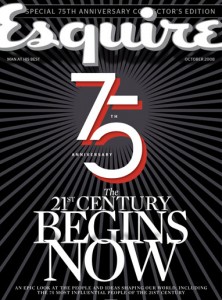 Esquire‘s 75th anniversary issue in October was a media sensation for its battery-powered cover and fat ad folio. But that’s about all the men’s magazine has to crow about this year. It’s lost 14.56 percent of its ad pages this year, according to Media Industry Newsletter, and that’s on par with performance at other monthlies. Quoting:
Esquire‘s 75th anniversary issue in October was a media sensation for its battery-powered cover and fat ad folio. But that’s about all the men’s magazine has to crow about this year. It’s lost 14.56 percent of its ad pages this year, according to Media Industry Newsletter, and that’s on par with performance at other monthlies. Quoting:
The Atlantic is down nearly 17 percent, and Vanity Fair is down almost 15 percent…In October, Condé Nast scaled back Men’s Vogue to two issues a year, leaving the three biggest men’s fashion magazines as GQ, Details (which lost 11.49 and 6.48 percent in ad pages, respectively) and Esquire.
Times are tough for broad consumer magazines. Newsweek may slash its circulation by as much as 60% in response to the high cost of production and postage, Folio magazine reports. The cuts may be as high as 1.6 million subscribers out of Newswek’s 2.6 million circulation base. Editors reportedly have Economist-envy and want to turn Newsweek into a magazine of thought leadership rather than a big old mass-market play. The Economist has a North American circulation of 714,000
Another factor in the cutbacks is that news magazines have been acquiring a much greater percentage of ‘non-renewable circ’ than they did before in order to satisfy advertiser demand. Non-renewable circ is mainly give-aways and promotions, making it expensive and less valuable that list-based paid subscriptions. Quoting:
“Such a drop in guaranteed circulation is not uncommon, particularly in the newsweekly category. Time cut its rate base by 750,000 copies in January 2007. Newsweek followed suit, dropping 500,000 copies from its circulation in November of that year.”
Fortunately, there’s Google. MediaPost says Google will create digital archives of the print editions of dozens of consumer magazines going back decades. The news comes not long after Google said it was making the entire photo archive of Life–about 10 million images–available online, including many that have never appeared in print. Google has been on a tear lately and its mission to digitize all the world’s printed content. In September, Google unveiled plans create historical archives of newspapers back to the very first print editions. Publishers are expected to make money by monetizing assets that had been all but out of reach to the public for many years.
2009 Seen Bringing New Wave of Consolidation, But Not the Happy Kind
BusinessWeek’s Jon Fine quotes newspaper executives saying that 2009 will see a fresh round of consolidation, but this one won’t be driven by visions of growth. Instead, mergers and acquisitions will be overseen by “big bankers seeking to ensure that the money they’ve lent, or at least a decent portion of it, is repaid.”
The bad news is spreading to other areas of traditional media. “Robert Coen, a senior vice-president at ad firm Magna who’s known for his ad forecasts, just predicted that local TV ad revenues will be down 9% this year and an additional 7% next year,” Fine writes. “In case you were wondering, Coen expects newspaper ad revenue to post another double-digit decline in ’09.” Ugh.
Cutbacks in Cincinnati
City Beat Cincinnati devotes an unbelievably long story to news that the Cincinnati EInquirer, the area’s only remaining daily newspaper, laid off several employees Dec. 2 and 3. At least 30 jobs were cut. That’s in addition to the voluntary severance packages that 60 staffers took in September.
In addition, the EInquirer‘s newshole will be reduced by six pages on Sundays and a total of 30 pages across the other weekdays beginning in three weeks. Editor Tom Callinan says the layoffs were concentrated among middle managers, not worker bees. “It was a personal statement that it was painful to lay off middle managers I know very well. But we did not touch one hour of reporting, even good reporters that we just hired. Good stories are our last best hope.”
Here Comes The Guardian!
Perhaps heartened by the success of the Financial Times in its cross-pond expansion, The Guardian plans to make its presence known on American shores this year. Quoting:
Tim Brooks, the managing director of Guardian News & Media said underscored the company’s commitment to continued growth in North America. “This year has seen the beginnings of serious investment in our North American presence, through the expansion of our editorial resource in Washington and the acquisition of ContentNext Media in New York and LA.”
Pulitzer Warily Embraces Online-Only Media
“Pulitzer Prizes Broadened to Include Online-Only Publications Primarily Devoted to Original News Reporting.” It’s the last part of that headline from Pulitzer press release that illustrates the conundrum the organization faces. The Pulitzer organization has been under increasing pressure to recognize the work of online-only media outlets, but doesn’t want to be swamped with entries from casual bloggers. So the organization this week, finally modified its criteria to include news organizations that don’t produce in print. The Board also decided to allow entries made up entirely of online content to be submitted in all 14 Pulitzer journalism categories.
Writing about the policy change, marketing guru Seth Godin comments:
“Tom Friedman can win a well-deserved prize for writing what is essentially a blog for the NY Times, but if he goes off on his own, he’s out. What a shame. As newspapers melt all around us, faster and faster, the people in the newspaper business persist in believing that the important element of a news-paper is the paper part.
“The opportunity…is to organize and network and identify and reward [responsible journalism] activity when it happens online. Not because the site is owned by a paper or because the founder has connections to the old media. No, because they’re doing work that matters. If I ran the Pulitzers, I’d hand out a dozen more every year to people working exclusively online.”
Miscellany
The Toledo Blade is laying off 23 people, most of them in the newsroom. The cuts are due to declining ad revenue and the newspaper’s ties to the auto industry. Assistant Managing Editor LuAnn Sharp said Wednesday that most of the layoffs will be in the newsroom. Five of the employees work part time. After the layoffs, The Blade will employ 425 companywide.
New York Times Co. CEO Janet Robinson says the company is ‘well-positioned to weather the challenges next year is expected to bring” and is not for sale. In preparing for a tough year, the Times Co. is mortgaging its headquarters and slashing its dividend. However, it appears that the company will at least remain viable, which can’t be said about some of its competitors.
Gannett’s chief financial officer said Wednesday that full-year 2008 revenue declined 8% and he expects headcount to continue to fall, ranging from mid- single-digit percent declines at USA Today to a mid-teen drop at Gannett’s U.K. operations. Fortunately, he also expects newsprint to decline by double-digit rates next year.
And Finally…
 Sheldon Cohen sold the landmark Out of Town News kiosk in Harvard Square in 1994 after 39 years, but now he wants it back. He told Cambridge, Mass. city councilors Monday night that he has been overwhelmed by reaction to the news that the current owners decided not to renew their lease. “I’m thinking of coming back,” he said. “This is an opportunity to bring some life back to the square.” to be fair, no one has proposed tearing down the kiosk. The most likely outcome is that it ends up as a Starbucks. Despite Cohen’s misgivings, he may quickly find that there is a reason the current owners want out. (Photo credit: Cambridge Chronicle)
Sheldon Cohen sold the landmark Out of Town News kiosk in Harvard Square in 1994 after 39 years, but now he wants it back. He told Cambridge, Mass. city councilors Monday night that he has been overwhelmed by reaction to the news that the current owners decided not to renew their lease. “I’m thinking of coming back,” he said. “This is an opportunity to bring some life back to the square.” to be fair, no one has proposed tearing down the kiosk. The most likely outcome is that it ends up as a Starbucks. Despite Cohen’s misgivings, he may quickly find that there is a reason the current owners want out. (Photo credit: Cambridge Chronicle)
Comments
This entry was posted on Thursday, December 11th, 2008 at 6:33 pm and is filed under Facebook, Fake News, Paywalls. You can follow any responses to this entry through the RSS 2.0 feed. Both comments and pings are currently closed.



It’s Cincinnati Enquirer, not Inquirer.
But I loves ya anyway.
Things are getting really scary..esp. when favorite magazines are dropping like flies…It just confirms that within a short period of time all will be done on line. Advertising is pretty cheap, ordering is easy and getting the word out takes a few dollars…The world will be indoors typing away on their computers for their lives